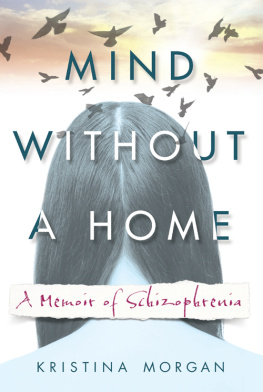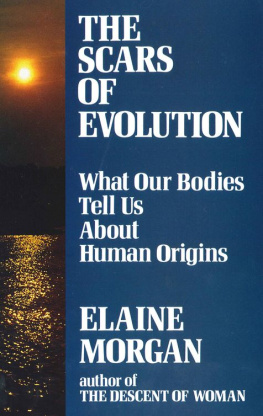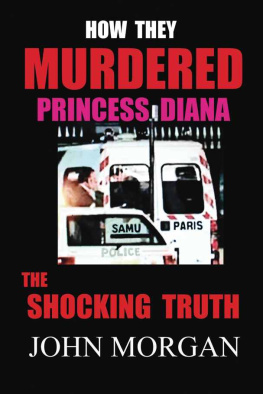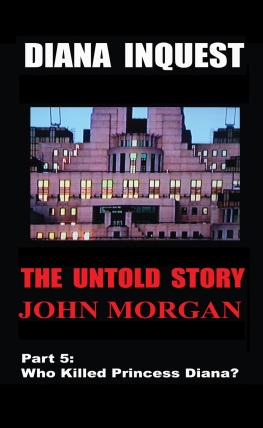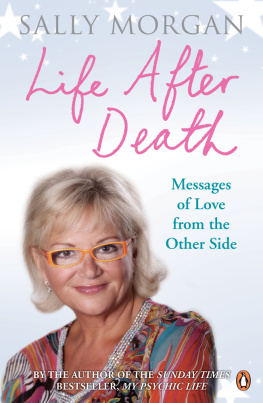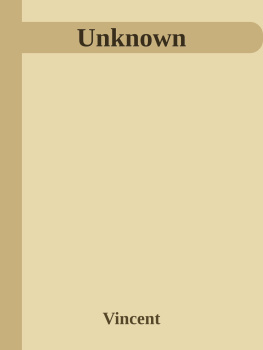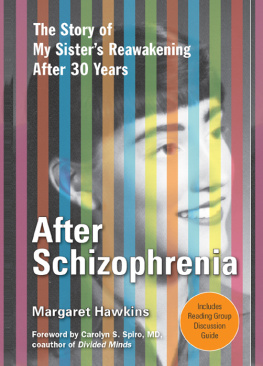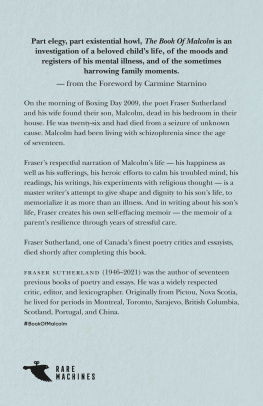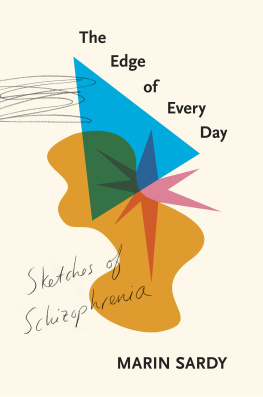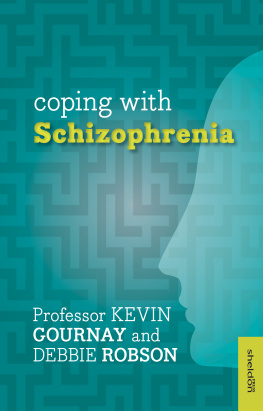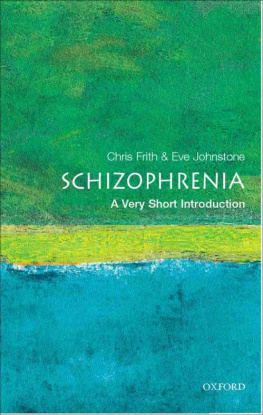Mind
without a
Home
Mind
without a
Home
A Memoir of Schizophrenia

KRISTINA MORGAN

Hazelden
Center City, Minnesota 55012
hazelden.org
2013 by Hazelden Foundation
All rights reserved. Published 2013.
Printed in the United States of America
No part of this publication, either print or electronic, may be reproduced in any form or by any means without the express written permission of the publisher. Failure to comply with these terms may expose you to legal action and damages for copyright infringement.
ISBN: 978-1-61649-460-5
Ebook ISBN: 978-1-61649-501-5
Manufactured in the United States of America
Editors note
This memoir is based on the authors actual experiences. Certain peoples names and identifying details have been changed to protect their identity. Some conversations and descriptions of events have been compressed or imaginatively recreated and are not intended as exact replications.
This publication is not intended as a substitute for the advice of health care professionals.
The Big Book is a registered trademark of Alcoholics Anonymous World Services, Inc.
The Twelve Steps are from Alcoholics Anonymous , 4th ed. (New York: Alcoholics Anonymous World Services, 2001), 5960.
16 15 14 13 1 2 3 4 5 6
Cover design: Jon Valk
Interior design and typesetting: Kinne Design
Developmental editor: Sid Farrar
Production editor: April Ebb

I would like to dedicate this book to Nancy Walker, my mother, and my grandmothers .
Literature is no ones private ground,
literature is common ground;
let us trespass freely and fearlessly
and find our way for ourselves .
VIRGINIA WOOLF
ACKNOWLEDGMENTS
My life is possible because of God and the people in it. The people I acknowledge here are not in any particular orderexcept, of course, my life partner, Guy, will be first. Smile. I thank all here and all not named for their unconditional support over the years.
Guy, you have been my rock. You have my heart. No one could have done better by me during my low points. You never missed a day visiting me at the hospital even though it was a 45-minute drive one way. And outside the hospital, you have inspired me to have strength.
Thank you, Jan Black, my spiritual healing therapist, for the many hours you spend with me and for placing my manuscript in the hands of Mike Fitzpatrick, who actually read it and then passed it on to Hazelden editor Sid Farrar, who too read it. Many thanks to Sid, April Ebb, and the Hazelden staff for working with me to create the best book possible. The serendipitous nature of all this has been truly amazing.
Thanks to Jon Valk, who designed the cover.
Bob and Marty Christopher have been pseudo parents and have always kept me in their prayers.
Christy Strauch has been in my life for fifteen years. She has listened to me read to her over the telephone countless times. Her suggestions are good ones, and I truly appreciate all the time she gives me.
Poet and dear friend Francie Noyes, you rock, as does Dot DiRienzi. Both of you inspire me. I hold you in my heart.
Pat Bates has been my longest writing friend. She was convinced I would someday publish. She has gained my respect for her psychic abilities over the years.
Cathy Capozzoli, another poet friend, inspires me with her own writing and sense of spirituality.
Writer Kriste Peoples read portions of the manuscript when it was still a long poem. She, too, encouraged me to continue.
I remember when I first saw Sandy Desjardins, writer and professor. She adds magic to any room she walks into. After ten years of silence, I began writing again under her tutelage.
Sheila Taube, writer and spiritual counselor, and Bonnie Vatz literally saved my life when I was at my lowest. They were light that made its way through the cracks of my darkness. I also thank Victor Taube, who has always been a stabilizing influence.
Norman Dubie, poet and professor, you are a wonderment. Thank you for being the chairperson on my committee at Arizona State University. And thank you for singing Buddha songs to me over the phone. I find you very healing, and you helped me through the grief over my grandmothers death.
Cynthia Hogue, poet and professor, thank you for the time you spent with me and my writing. You said this manuscript would be my masterpiece. And thank you for sharing your experiences with love.
Alberto Rios, poet and professor and another member of my writing committee at ASU, thank you for your support.
Thank you, Saashley, Paula, and Susie. Thank you, Art Awakenings, for providing me with a place to go to outside of my bedroom, where I had been trapped by my own mind.
Thank you, Dr. Frankie Moorehead and Kathy Hernandez, for being a great psychiatric team. You did great by me.
Many thanks to the staff at Thunderbird Banner Hospitals mental health unit for always taking good care of me when I was psychotic or unable to get along in the common reality.
Thanks to Trish Scanlan for being such a good cheerleader.
My family members, Barbara and Jack Morgan, Stephanie Doller and James Loper, thank you for your love and support.
My life feels like not mine, which is good. It allows me to know that I am not the only one in the city. I am here as a result of a collaborative effort. With little daily things, sometimes simply a smile, I hope to give back a bit of what I have so freely been given. Life is fabulous, and thanks to these and so many other people, I can show up for it.
Description of Schizophrenia
Schizophrenia may be characterized by delusions, hallucinations, disorganized speech (e.g., frequent derailment or incoherence), grossly disorganized or catatonic behavior, and other negative symptoms (e.g., diminished emotional expression and reduced drive). There is also often a deterioration in work, interpersonal relations, or self-care.
People with schizophrenia may display inappropriate affect, depression, anxiety, or anger as well as a disturbed sleep pattern and a lack of interest in eating or food refusal. Depersonalization (a sense of detachment from oneself), derealization (the external world appears unreal), and cognitive deficits in schizophrenia are also common.
The lifetime prevalence of schizophrenia appears to be approximately 0.30.7 percent with the psychotic features of schizophrenia typically emerging between the late teens and the mid-30s.
Approximately 56 percent of people with schizophrenia die by suicide, about 20 percent attempt suicide on one or more occasions, and many more have significant suicidal ideation.

Adapted from American Psychiatric Association. Diagnostic and Statistical Manual of Mental Disorders . 5th ed. Arlington, VA: American Psychiatric Association, 2013.
Prologue (September 1993)
I am twenty-nine years old.
At eleven years of sobriety, a heavy cloud drops on my head. Voices from other realities plague me like a gaggle of hurt geese that cant find their way home. Men and women in black suits appear in my home and at my front door and in the grocery store aisles where cans neatly line the shelves, and boxes of cereal promise to make me an Olympian. Their presence is a plague. In three months time, I overdose seven times. The intensive care attendants get sick and tired of bringing me back. They refuse me cups of soda and stop washing my forehead with soft cloths in the ICU.

